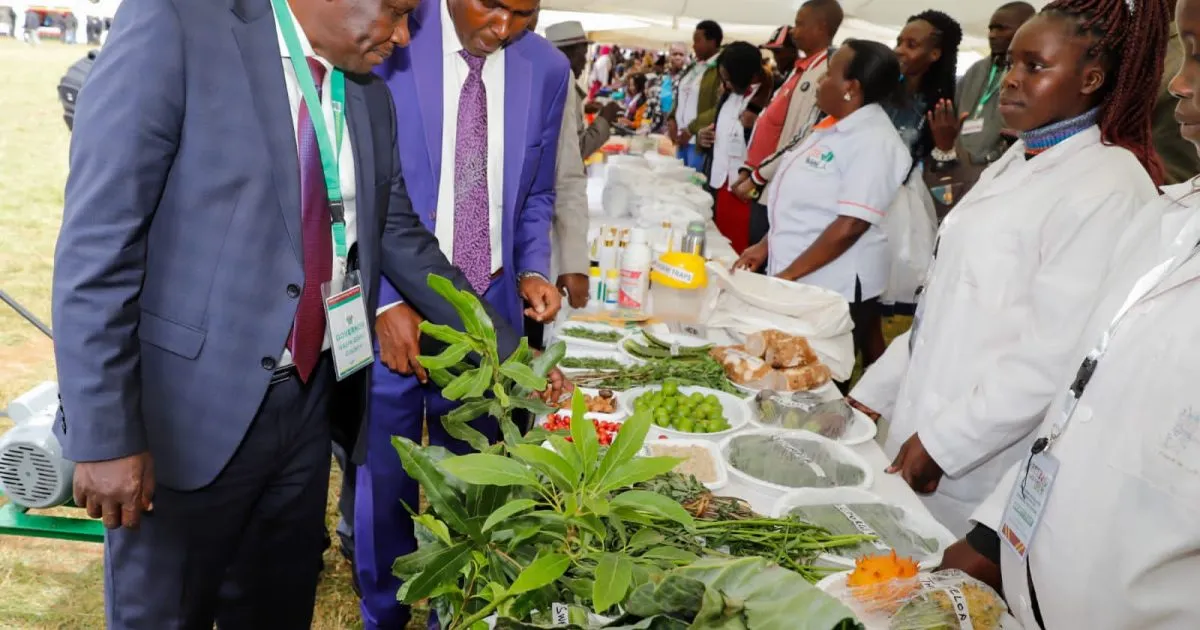In a major breakthrough for smallholder farmers and the broader agricultural sector, the Green Climate Fund (GCF) has released a grant of $75 million—equivalent to Sh9.7 billion—to support initiatives aimed at reducing post-harvest losses and improving livelihoods in Kenya and six other African countries. The funding, announced on February 21, 2025, comes as part of the Re-gain initiative—a project launched at the African Heads of States Food Systems Session during COP28 in Dubai. The grant will be administered under the supervision of the Alliance for a Green Revolution in Africa (AGRA) and is set to transform the agricultural landscape by tackling one of the most pressing challenges faced by cereal farmers and other smallholder producers.
Tackling a Crisis of Post-Harvest Losses
Post-harvest loss is a persistent and costly challenge in Kenya. According to Kenya’s Climate Smart Agriculture Investment Plan, an estimated 40 percent of harvested crops are lost each year—a figure that translates into financial losses of up to Sh65 billion. For cereal farmers and producers of other staples such as maize, tomatoes, and horticultural products, these losses not only reduce income but also undermine food security and economic stability.
One of the key reasons behind these losses is the lack of modern technology and infrastructure. Farmers often resort to traditional methods of harvesting and storage, resulting in significant waste. For example, maize is particularly vulnerable to pest infestations—common culprits include maize weevils (Sitophilus zeamais) and larger grain borers (Prostephanus truncatus)—as well as aflatoxin contamination, which renders between 16 and 30 percent of maize unsuitable for consumption or sale. In the case of horticultural produce like mangoes and tomatoes, inadequate harvesting techniques, poor handling, and substandard storage conditions further exacerbate losses, sometimes reaching levels as high as 25 to 50 percent along the value chain.
The Re-gain Initiative: A New Hope for African Farmers
The Re-gain initiative is designed to address these challenges head-on by enhancing smallholders’ access to innovative technologies and improving the entire post-harvest value chain. The initiative aims to make food loss reduction solutions more accessible and affordable, thereby creating an enabling environment for transitioning food systems towards sustainability and resilience. Launched two years ago during COP28 in Dubai, Re-gain represents a collaborative effort between governments, private sector partners, and international financial institutions.
Dr. Agnes Kalibata, the outgoing president of AGRA, expressed her enthusiasm about the funding release:
“The funds become available immediately, and we thank the GCF for working extremely hard to get the resources to people who need them the most.”
The grant is expected to have a significant multiplier effect. By equipping cooperatives and agrodealers with modern threshing machines, standard storage facilities, and innovative value addition technologies, the initiative aims to reduce post-harvest losses dramatically. For instance, agrodealers will be supplied with hermetic storage bags that help preserve the quality of cereals without relying on harmful pesticide chemicals, thereby ensuring safer storage and longer shelf life.
Expanding Access Through the GCF’s Project Specific Assessment Approach
A notable aspect of this funding round is that it marks the first programme to emerge from the GCF’s Project Specific Assessment Approach (PSAA). According to Mafalda Duarte, the GCF Executive Director, the PSAA is designed to broaden access to GCF resources by working with new partners, countries, and technologies that have traditionally been underserved by the existing accredited entity network. This innovative approach not only streamlines funding processes but also extends the reach of climate finance to organizations that were previously excluded from direct access to GCF resources.
The PSAA is particularly significant for smallholder farmers who are often sidelined in large-scale funding mechanisms. By opening up access to a wider range of partners and technologies, the initiative ensures that innovative solutions can be deployed rapidly and effectively across multiple African markets. In addition to Kenya, the Re-gain initiative will also benefit Burkina Faso, Ethiopia, Malawi, Tanzania, Uganda, and Zambia—countries that face similar challenges in reducing food waste and enhancing food security.
Strengthening Cooperatives and Private Sector Partnerships
John Macharia, AGRA’s Country Manager for Kenya, highlighted the importance of utilizing existing networks to disseminate these technological innovations:
“We will identify cooperatives in 12 cereal-producing counties, through which we will invest in innovations and technologies such as threshing and even value addition. Smallholder farmers can easily access the machinery, standard storage, and different solutions conveniently and affordably.”
By channeling funds through cooperatives and private sector partners, the initiative leverages established relationships and distribution networks to maximize impact. Cooperatives, which are the backbone of Kenya’s agricultural sector, will play a critical role in aggregating demand and ensuring that farmers—many of whom operate on a small scale—can benefit from economies of scale. This strategy is expected to not only reduce post-harvest losses but also improve overall productivity and market access for smallholder farmers.
Addressing Climate Change and Food Security Hand-in-Hand
Post-harvest loss reduction is not just an economic imperative—it is also a crucial element in mitigating climate change. By saving more of what is harvested, there is less need to clear additional land for agricultural production. This, in turn, helps preserve natural ecosystems and reduces greenhouse gas emissions associated with land-use change. Dr. Kalibata noted:
“We do recognise that post-harvest losses are a critical part of growing markets in the target countries; addressing it will play a critical role in improving food security for farmers, but it is also a critical part of mitigating climate change because if we can save more, we do not need more land to produce more.”
In this context, the Sh9.7bn grant is a dual investment—it not only bolsters the livelihoods of smallholder farmers but also contributes to global efforts to combat climate change. As climate variability increases, so too does the risk of crop failure and pest infestations. Investing in technologies that reduce post-harvest losses creates a buffer against these uncertainties, making food systems more resilient and sustainable.
The Broader Impact on Kenya’s Agricultural Sector
Kenya’s agricultural sector is a cornerstone of the nation’s economy, providing employment for millions and contributing significantly to GDP. However, the sector has long been plagued by inefficiencies, particularly in the post-harvest stage. The introduction of modern technologies and improved infrastructure promises to transform the sector by reducing waste and increasing productivity.
For example, maize—a staple crop in Kenya—suffers an average loss of 16.7 percent post-harvest. With improved storage and handling techniques, this loss could be significantly curtailed, translating into higher incomes for farmers and more stable food supplies for consumers. Similarly, other crops such as tomatoes, mangoes, and dairy products stand to benefit from targeted interventions that address the unique challenges of each value chain.
Beyond immediate economic benefits, the initiative is expected to have a positive social impact. By reducing waste and increasing the availability of food, the project can help stabilize market prices and improve food security for rural communities. Moreover, the introduction of modern farming technologies is likely to spur further innovation and investment in Kenya’s agricultural sector, setting the stage for long-term growth and development.
Leveraging Technology to Combat Post-Harvest Loss
The successful implementation of the Re-gain initiative hinges on the adoption of innovative technologies designed to address specific challenges in the post-harvest process. Some of the key technological interventions include:
- Modern Threshing Machines: Traditional threshing methods are labor-intensive and inefficient. Modern machines can significantly reduce the time and labor required to separate grains from stalks, ensuring that a higher proportion of the harvest is preserved.
- Hermetic Storage Solutions: Hermetic storage bags and containers offer a chemical-free method of preserving harvested crops. By creating an airtight environment, these solutions inhibit the growth of pests and prevent moisture loss, thereby maintaining the quality of the produce.
- Value Addition Technologies: By integrating value addition processes at the farm level, smallholder farmers can transform raw produce into higher-value products. This not only reduces waste but also opens up new markets and revenue streams.
- Digital Platforms: Mobile and digital technologies can facilitate better market linkages, providing farmers with real-time information on prices, weather conditions, and best practices for crop handling. These platforms empower farmers to make informed decisions that minimize losses.
By integrating these technologies into a comprehensive support package, the Re-gain initiative is set to revolutionize the way post-harvest operations are conducted in Kenya and beyond. The focus on technological innovation ensures that the solutions are not only effective in reducing waste but also scalable, allowing for rapid expansion across diverse agricultural landscapes.
The Role of AGRA in Transforming African Agriculture
AGRA, the Alliance for a Green Revolution in Africa, has been at the forefront of efforts to modernize and transform agriculture across the continent. With decades of experience in promoting sustainable farming practices and enhancing the productivity of smallholder farmers, AGRA is well positioned to lead the Re-gain initiative. Dr. Agnes Kalibata’s leadership in the organization has been instrumental in driving policies and programs that support climate-smart agriculture and food security.
Under AGRA’s guidance, the Re-gain initiative is expected to create a replicable model that can be adapted to different contexts within Africa. The focus on collaborative partnerships—bringing together governments, private investors, cooperatives, and technology providers—ensures that the initiative addresses the multifaceted challenges of post-harvest loss in a holistic manner.
Expanding Benefits Beyond Kenya
While Kenya is set to be the primary beneficiary of the Sh9.7bn grant, the impact of the Re-gain initiative will extend to other African nations facing similar challenges. Burkina Faso, Ethiopia, Malawi, Tanzania, Uganda, and Zambia have all been identified as key target countries for the project. These nations share common challenges in terms of post-harvest losses, infrastructure deficits, and vulnerability to climate change. By leveraging the expertise and resources of AGRA and the GCF, the initiative aims to create a ripple effect that enhances food security and economic resilience across the region.
The regional approach is especially important given the interconnected nature of African agricultural markets. Improvements in one country can have positive spill-over effects on neighboring markets, facilitating better trade linkages, standardizing quality, and increasing overall competitiveness. This collaborative strategy aligns with broader regional efforts to promote sustainable development and achieve the United Nations’ Sustainable Development Goals (SDGs).
Economic and Social Implications for Smallholder Farmers
For smallholder farmers, the reduction of post-harvest losses translates directly into increased income and improved livelihoods. In a sector where margins are often thin and risks high, even modest improvements in efficiency can have a significant impact on household incomes and community well-being. By ensuring that more of the harvest reaches the market in good condition, the initiative helps to stabilize supply chains and boost overall agricultural productivity.
Moreover, reducing post-harvest losses can have a transformative effect on rural economies. With less waste, farmers can command better prices for their produce, reinvest in improved farming practices, and contribute to local economic growth. The creation of jobs through the establishment of new agro-processing facilities and storage infrastructure further amplifies these benefits, providing opportunities for skills development and reducing rural unemployment.
Addressing Long-Term Challenges Through Innovation
The current funding comes at a critical time as climate change continues to intensify the challenges faced by agricultural sectors worldwide. In Kenya, climate variability—ranging from unpredictable rainfall patterns to increased incidences of pest infestations—has made traditional farming practices increasingly unsustainable. The Re-gain initiative represents a proactive approach to these challenges by integrating climate resilience into the agricultural value chain.
By adopting modern technologies and improving post-harvest practices, the initiative not only mitigates the effects of climate change but also creates a more robust agricultural system capable of withstanding future shocks. As Dr. Kalibata noted, saving more of the harvest means that less land needs to be converted for agricultural use, thereby preserving natural ecosystems and contributing to broader environmental sustainability.
A Promising Path Forward
The Sh9.7bn climate funding for reducing post-harvest losses is more than just an investment in technology—it is an investment in the future of African agriculture. By addressing one of the most critical challenges in the food supply chain, the Re-gain initiative is set to create a lasting impact on food security, economic growth, and environmental sustainability. As cooperatives, private sector partners, and smallholder farmers come together to implement innovative solutions, the promise of a more efficient, resilient, and sustainable agricultural sector becomes ever more tangible.
The success of this initiative will serve as a model for similar projects not only in Africa but also in other regions grappling with the dual challenges of food waste and climate change. With continued support from international organizations like the GCF and strong leadership from bodies such as AGRA, the path forward looks promising for smallholder farmers across the continent.
Conclusion: A Catalyst for Change in African Agriculture
The release of Sh9.7bn in climate funding marks a watershed moment for cereal farmers and smallholder agricultural communities in Kenya and beyond. By addressing the longstanding issue of post-harvest losses—which currently siphon off nearly 40 percent of harvested crops and result in financial losses of up to Sh65 billion annually—the Re-gain initiative is set to transform agricultural practices and bolster food security in some of Africa’s most vulnerable regions.
Through strategic investments in modern technology, the creation of enabling environments via cooperatives and private sector partnerships, and the innovative use of the GCF’s Project Specific Assessment Approach, this initiative offers a comprehensive solution to a complex problem. It not only enhances the livelihoods of smallholder farmers by reducing waste and increasing income but also plays a crucial role in mitigating climate change and promoting sustainable land use.
As the project rolls out in Kenya—with plans to extend its benefits to Burkina Faso, Ethiopia, Malawi, Tanzania, Uganda, and Zambia—the potential for broader regional impact is immense. With improved post-harvest practices, farmers can capture a greater share of their produce’s value, boost economic resilience in rural communities, and contribute to a more secure and sustainable food supply for millions.
In an era where climate challenges are becoming more pronounced and food security is increasingly critical, the Sh9.7bn climate funding is a beacon of hope for Africa’s agricultural future. By bridging the gap between traditional farming practices and modern technological solutions, the Re-gain initiative is poised to catalyze a new wave of agricultural innovation and sustainability—one that will benefit smallholder farmers today and pave the way for a more resilient tomorrow.
With the continued support of international finance mechanisms, government agencies, and dedicated agricultural institutions, Africa is taking significant strides toward a future where less is wasted and more is saved—ensuring that every harvest contributes to prosperity and food security. The transformation of post-harvest practices is not just a win for farmers; it is a crucial step forward in the global fight against climate change and a testament to the power of innovation in creating a better world.
As stakeholders across the value chain—from policy makers and technology providers to cooperatives and individual farmers—embrace this transformative approach, the landscape of African agriculture is set for a remarkable turnaround. The journey toward reducing post-harvest losses is well underway, promising enhanced livelihoods, economic growth, and a sustainable, food-secure future for generations to come.
Ultimately, the Sh9.7bn investment in the Re-gain initiative represents more than just financial support—it symbolizes a commitment to empowering smallholder farmers, preserving Africa’s natural resources, and building a resilient agricultural ecosystem capable of thriving in the face of an ever-changing climate.
Ready to take your career to the next level? Join our dynamic courses: ACCA, HESI A2, ATI TEAS 7 , HESI EXIT , NCLEX – RN and NCLEX – PN, Financial Literacy!🌟 Dive into a world of opportunities and empower yourself for success. Explore more at Serrari Ed and start your exciting journey today! ✨
photo source: Google
By: Montel Kamau
Serrari Financial Analyst
26th February, 2025
Article, Financial and News Disclaimer
The Value of a Financial Advisor
While this article offers valuable insights, it is essential to recognize that personal finance can be highly complex and unique to each individual. A financial advisor provides professional expertise and personalized guidance to help you make well-informed decisions tailored to your specific circumstances and goals.
Beyond offering knowledge, a financial advisor serves as a trusted partner to help you stay disciplined, avoid common pitfalls, and remain focused on your long-term objectives. Their perspective and experience can complement your own efforts, enhancing your financial well-being and ensuring a more confident approach to managing your finances.
Disclaimer: This article is for informational purposes only and does not constitute financial advice. Readers are encouraged to consult a licensed financial advisor to obtain guidance specific to their financial situation.
Article and News Disclaimer
The information provided on www.serrarigroup.com is for general informational purposes only. While we strive to keep the information up to date and accurate, we make no representations or warranties of any kind, express or implied, about the completeness, accuracy, reliability, suitability, or availability with respect to the website or the information, products, services, or related graphics contained on the website for any purpose. Any reliance you place on such information is therefore strictly at your own risk.
www.serrarigroup.com is not responsible for any errors or omissions, or for the results obtained from the use of this information. All information on the website is provided on an as-is basis, with no guarantee of completeness, accuracy, timeliness, or of the results obtained from the use of this information, and without warranty of any kind, express or implied, including but not limited to warranties of performance, merchantability, and fitness for a particular purpose.
In no event will www.serrarigroup.com be liable to you or anyone else for any decision made or action taken in reliance on the information provided on the website or for any consequential, special, or similar damages, even if advised of the possibility of such damages.
The articles, news, and information presented on www.serrarigroup.com reflect the opinions of the respective authors and contributors and do not necessarily represent the views of the website or its management. Any views or opinions expressed are solely those of the individual authors and do not represent the website's views or opinions as a whole.
The content on www.serrarigroup.com may include links to external websites, which are provided for convenience and informational purposes only. We have no control over the nature, content, and availability of those sites. The inclusion of any links does not necessarily imply a recommendation or endorsement of the views expressed within them.
Every effort is made to keep the website up and running smoothly. However, www.serrarigroup.com takes no responsibility for, and will not be liable for, the website being temporarily unavailable due to technical issues beyond our control.
Please note that laws, regulations, and information can change rapidly, and we advise you to conduct further research and seek professional advice when necessary.
By using www.serrarigroup.com, you agree to this disclaimer and its terms. If you do not agree with this disclaimer, please do not use the website.
www.serrarigroup.com, reserves the right to update, modify, or remove any part of this disclaimer without prior notice. It is your responsibility to review this disclaimer periodically for changes.
Serrari Group 2025





